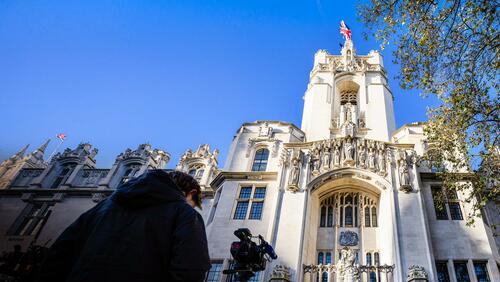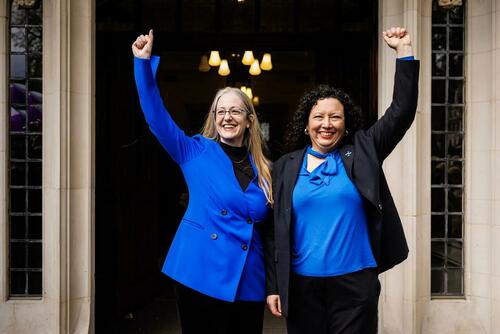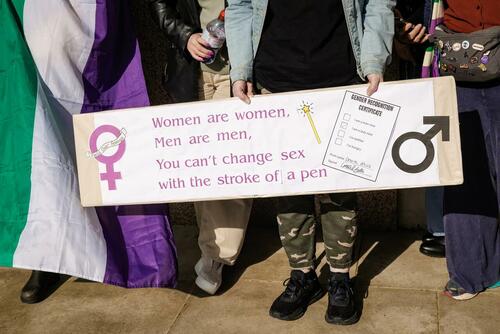
Что нужно знать о решении Верховного суда Великобритании по сексу и полу
Автор: Гай Бирчелл (Guy Birchall) на сайте The Epoch Times (подчеркните наш),
Верховный суд Великобритании постановил, что слова «женщина» и «секс» относятся к «биологической женщине и биологическому сексу».Это знаковое решение, которое следует за годами смятения, гнева и агитации.
 Протестующие собираются возле Верховного суда в Лондоне 15 ноября 2023 года. 15 апреля высший суд Великобритании постановил, что слова «женщина» и «секс» относятся к «биологической женщине и биологическому полу». Леон Нил / Getty Images
Протестующие собираются возле Верховного суда в Лондоне 15 ноября 2023 года. 15 апреля высший суд Великобритании постановил, что слова «женщина» и «секс» относятся к «биологической женщине и биологическому полу». Леон Нил / Getty ImagesДело было направлено на разъяснение вопроса о том, имеет ли лицо, имеющее официальное свидетельство о признании своего пола в качестве женщины, право на такую же защиту прав женщин в соответствии с законом.
В качестве обычно цитируемого примера был приведен вопрос о том, разрешается ли исключать мужчин, имеющих свидетельство о признании пола, из сферы услуг только для женщин, например группы поддержки в связи с кризисом изнасилования.
Сертификат о признании пола означает, что выбранная гендерная идентичность человека юридически признана.
Получение сертификата требует медицинского диагноза гендерной дисфории, прожив как идентифицированный пол не менее двух лет, и намерения жить как этот самоидентифицированный пол до смерти.
В Соединенном Королевстве с момента их введения в соответствии с Законом о признании пола 2005 года было выдано более 8000 сертификатов о признании пола.
1. Как было возбуждено дело
Дело было инициировано группой кампании «За женщин Шотландии» в 2022 году, которая выдвинула ряд юридических проблем, начиная с Шотландии и заканчивая Верховным судом Великобритании, по определению слова «женщина» в Законе о гендерном представительстве в общественных советах (Шотландия) 2018 года.
Этот закон был принят шотландским парламентом и предписывал, чтобы 50 процентов лиц в общественных советах были женщинами, в том числе в его определении мужчины, которые идентифицируют себя как женщины.
Адвокаты «За женщин» Шотландии утверждали, что непривязывание определения секса к его «обычному значению» может иметь далеко идущие последствия для прав, основанных на сексе, а также «повседневных услуг для одного пола», таких как ванные комнаты, раздевалки, больничные палаты, а также кризисные центры домашнего насилия и изнасилования.
Адвокат шотландского правительства утверждал на слушаниях в Верховном суде в ноябре 2024 года, что человек с свидетельством о признании пола «признан в законе» как изменивший пол.
 Празднование вне Верховного суда в Лондоне 16 апреля 2025 года. Суд единогласно постановил, что термины «женщина и секс» в Законе о равенстве 2010 года относятся к биологической женщине и биологическому полу. Это решение позволяет мужчинам, которые идентифицируют себя как женщины, даже с сертификатом о признании пола, быть исключенными из однополых пространств. Дэн Китвуд / Getty Images
Празднование вне Верховного суда в Лондоне 16 апреля 2025 года. Суд единогласно постановил, что термины «женщина и секс» в Законе о равенстве 2010 года относятся к биологической женщине и биологическому полу. Это решение позволяет мужчинам, которые идентифицируют себя как женщины, даже с сертификатом о признании пола, быть исключенными из однополых пространств. Дэн Китвуд / Getty Images2. Правление
15 апреля Верховный суд постановил, что секс уходит корнями в биологию, а не то, выбрал ли человек определенный пол.
Лорд Патрик Ходж, заместитель председателя Верховного суда Великобритании, сказал, что главный вопрос заключается в том, как слова «женщина» и «секс» определены в Законе о равенстве 2010 года.
"Термины «женщина и секс» в Законе о равенстве 2010 года относятся к биологической женщине и биологическому полу.- сказал Ходж.
Это означает, что мужчины, которые идентифицируют себя как женщины и которые имеют свидетельство о признании пола, могут быть исключены из мест для представителей одного пола, если они "пропорционально". "
Судьи заявили, что, хотя слово «биологический» не фигурирует в определении мужчины или женщины в Законе о равенстве, «обычное значение этих простых и однозначных слов соответствует биологическим характеристикам, которые делают человека мужчиной или женщиной». "
В решении говорится, что если в законодательстве 2010 года слово «секс» не означает «биологический секс», поставщики однополых помещений, включая раздевалки, хостелы для бездомных и медицинские услуги, столкнутся с «практическими трудностями», а любая другая интерпретация сделает правила против дискриминации по признаку сексуальной ориентации бессмысленными.
Суд заявил, что такое толкование закона не ставит в невыгодное положение людей, которые идентифицируют себя как трансгендеры, которые были описаны как «потенциально уязвимая группа». "
Они заявили, что группа по-прежнему защищена от дискриминации и «при необходимости сможет ссылаться на положения о прямой дискриминации и притеснениях и косвенной дискриминации».
Судьи также заявили, что трансгендерные люди защищены от дискриминации по признаку смены пола.
 Активисты, называющие себя активистками за права женщин, стоят рядом с активисткой за избирательное право Дамой Миллисент Фосетт на Парламентской площади в Лондоне 16 апреля 2025 года. Верховный суд постановил, что секс коренится в биологии, а не в том, выбрал ли человек противоположный пол. Дэн Китвуд / Getty Images
Активисты, называющие себя активистками за права женщин, стоят рядом с активисткой за избирательное право Дамой Миллисент Фосетт на Парламентской площади в Лондоне 16 апреля 2025 года. Верховный суд постановил, что секс коренится в биологии, а не в том, выбрал ли человек противоположный пол. Дэн Китвуд / Getty Images3. Депутаты могут отменить суд
Верховный суд Соединенного Королевства является окончательным апелляционным судом для всех гражданских дел в Великобритании и всех уголовных дел, происходящих в Англии, Уэльсе и Северной Ирландии.
Он также охватывает ограниченное число уголовных дел из Шотландии, которые технически имеют отдельную правовую систему.
Однако решение Верховного суда в Великобритании имеет гораздо меньший вес, чем в Соединенных Штатах.
Законодатели в Великобритании не связаны кодифицированной конституцией, которая может быть изменена только через супербольшинство и другие препятствия для ратификации.
Скорее, парламент может эффективно отменить решение Верховного суда, проголосовав в новом законодательстве.
Таким образом, простое большинство голосов законодателей - это все, что потребуется для отмены этого закона и принятия нового закона, который требует, чтобы мужчины, которые идентифицируют себя как женщины, относились точно так же, как и женщины.
4. Вопросы без ответа
С момента принятия решения многие государственные органы и учреждения обновили свои правила, в то время как другие все еще ждут ясности.
Комиссия по вопросам равенства и прав человека, которая несет ответственность за поощрение и обеспечение соблюдения законов о равенстве и недискриминации в Великобритании, как ожидается, представит обновленный уставный кодекс практики перед парламентом к лету и заявила, что работает «в темпе, чтобы включить последствия этого решения» в кодекс для государственных органов, излагающих свои обязанности в соответствии с Законом о равенстве.
Это означает, что В настоящее время, несмотря на решение Верховного суда, ситуация далеко не ясна.
5. Полицейский обыск
Британская транспортная полиция стала первым государственным органом, который принял меры, изменив свою политику поиска полосы на следующий день после решения суда, заявив, что она приняла новую «временную позицию», в соответствии с которой трансгендерные лица будут обыскиваться офицером в соответствии с их биологическим полом.
Это означает, что мужчины, находящиеся под стражей, будут обыскиваться офицерами-мужчинами, в то время как мужчины-офицеры, которые идентифицируют себя как транс-женщины, больше не смогут обыскивать женщин-заключенных.
Совет начальников национальной полиции заявил, что будет пересматривать свою политику, но «нужно время, чтобы рассмотреть все последствия решения суда, как и многие другие государственные органы». "
Читайте остальное здесь...
Тайлер Дерден
Солнце, 04/27/2025 - 08:10













![Makabryczna czołówka w Dziecininie. Nie żyje 61-letnia kobieta [ZDJĘCIA+FILM]](https://static2.supertydzien.pl/data/articles/xga-4x3-makabryczna-czolowka-w-dziecininie-nie-zyje-61-letnia-kobieta-zdjecia-1756194673.jpg)

